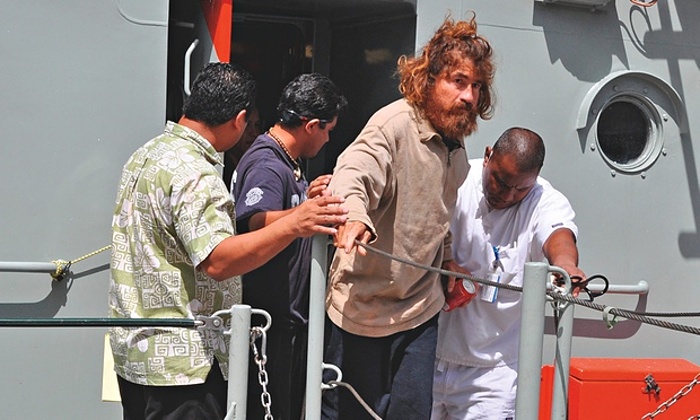by Daniel Barker
In a bizarre case reminiscent of both Gilligan’s Island and Silence of the Lambs, an El Salvadoran fisherman is being sued for $1 million for alleged cannibalism.
Salvador Alvarenga, 36, made international headlines in January last year when he washed ashore on the Marshall Islands in the Pacific Ocean, after spending more than a year adrift on his boat that was crippled in a storm during a fishing expedition off the coast of Mexico.
During the 15 months at sea, Alvarenga’s boat drifted 6,700 miles, before reaching the remote Pacific islands where he was rescued.
Although Alvarenga somehow managed to survive the ordeal, his 22-year-old crew mate, Ezequiel Cordoba, did not.
According to Alvarenga, the younger man died because he could not eat the raw birds and turtle blood which were the only food available. He claims that Cordoba succumbed to starvation early on, and that he kept the body in the boat for “company” for six days before eventually tossing it overboard.
Cordoba’s family disputes this account, claiming that Alvarenga ate the flesh of his crew mate in order to survive.
Alvarenga denies the allegations and his lawyer, Ricardo Cucalón, suggests that the reason the family has suddenly filed the lawsuit is because his client’s book detailing the ordeal has just been published.
Cucalón said, “I believe that this demand is part of the pressure from this family to divide the proceeds of royalties.
“Many believe the book is making my client a rich man, but what he will earn is much less than people think.”
‘A tale of a fateful trip’
The tragic journey began in November 2012, when Alvarenga and Cordoba set out in a small boat from a fishing village on the southern Mexican coast in the state of Chiapas. The two men had embarked on a tuna fishing expedition when they encountered bad weather and disappeared.
After a fruitless two-week search, local authorities gave up on finding the two men. Meanwhile, the boat began drifting further out to sea.
Nearly a year and a half later the boat and its sole surviving passenger ended up washing ashore on Ebon, an atoll in the Marshall Islands.
The rescue of Alvarenga captured the attention of the media and the public since it seemed scarcely believable that anyone could survive so long adrift in the Pacific in such a small boat, and without supplies.
Alvarenga maintains he is still alive because “I always had faith in God that I was going to live, asking Him every day, every night.”
He said he survived by eating raw fish, birds and jellyfish that he managed to catch with his hands, and by drinking his own urine and turtle blood.
Is cannibalism legal?
As distasteful as it might seem, many people throughout history have survived such ordeals by eating human flesh. Two famous cases include the ill-fated Donner party – a group of settlers who became stranded in the snow while trying to cross the Rocky Mountains during the 19th century – and a group of soccer players who survived an airplane crash in the Andes during the 1970s.
An article in The Guardian posed the question: “Is eating someone’s flesh in such extreme conditions against the law?”
The answer, according to senior lecturer Samantha Pegg of Nottingham Trent University, is no – at least in the United Kingdom. “There is no offence of cannibalism in our jurisdiction,” she said.
Pegg pointed to a similar case from the 19th century in which a four-man English crew were shipwrecked en route to Australia. Faced with possible starvation, two of the men killed and ate the 17-year-old cabin boy who had fallen ill. The two were charged with murder, the third survivor was not – even though he ate some of the flesh.
It’s a terrible thought to contemplate, but it’s been proven time and time again that humans will do almost anything to survive.
How about you? Could you eat human flesh if your own survival depended on it?



